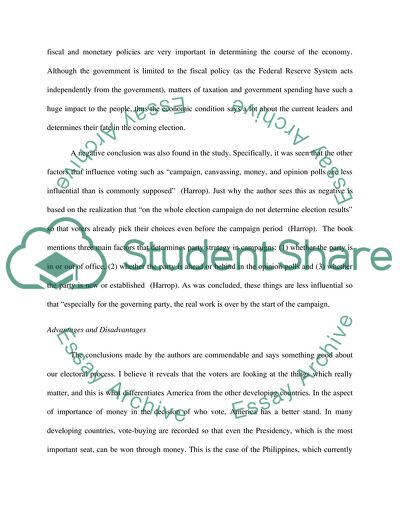
- Home
- Free Samples
- Premium Essays
- Editing Services
- Extra Tools
- Essay Writing Help
- About Us
- Studentshare
- Subjects
- Miscellaneous
- Presentation
Presentation - Essay Example

- Subject: Miscellaneous
- Type: Essay
- Level: Undergraduate
- Pages: 4 (1000 words)
- Downloads: 0
- Author: marquiselebsack
Extract of sample "Presentation"
The theory summarized its findings in two wide conclusions: One is that “trends in the national economy as reported in the media, are a regular influence on variations around base-line level of party support. Other political events – international and domestic crises, change in political leadership, political scandals – may have large and dramatic effects on voting intentions, but in contrast to such short-run influences the economy is a permanent fixture of continuing interest to nearly all electors” (Harrop).
Indeed a very important consideration in who to vote is the capacity to lead and make the economic condition of the populace better. The economy is indeed a major consideration as rascal political might bring the economy to doom, causing the suffering of its citizens. Both fiscal and monetary policies are very important in determining the course of the economy. Although the government is limited to the fiscal policy (as the Federal Reserve System acts independently from the government), matters of taxation and government spending have such a huge impact to the people, thus the economic condition says a lot about the current leaders and determines their fate in the coming election.
A negative conclusion was also found in the study. Specifically, it was seen that the other factors that influence voting such as “campaign, canvassing, money, and opinion polls are less influential than is commonly supposed” (Harrop). Just why the author sees this as negative is based on the realization that “on the whole election campaign do not determine election results” so that voters already pick their choices even before the campaign period (Harrop). The book mentions three main factors that determines party strategy in campaigns: (1) whether the party is in or out of office, (2) whether the party is ahead or behind in the opinion polls and (3) whether the party is new or
...Download file to see next pages Read More
- TERMS & CONDITIONS
- PRIVACY POLICY
- COOKIES POLICY